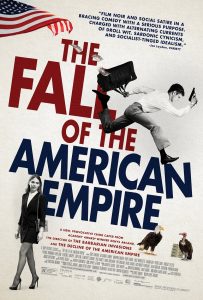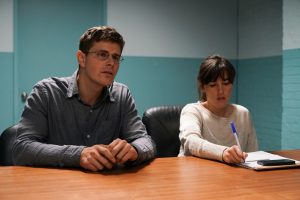‘American Empire’ takes a critical look at what has value
“The Fall of the American Empire” (“La chute de l’empire américain”) (2018 production, 2019 release). Cast: Alexandre Landry, Maripier Morin, Rémy Girard, Maxim Roy, Louis Morissette, Florence Longpré, Patrick Emmanuel Abellard, Pierre Curzi, Vincent Leclerc, Eddy King, Anoulith Sintharaphone, Ayana O’Shun, Kémy St-Eloy. Director: Denys Arcand. Screenplay: Denys Arcand. Web site. Trailer.
We all have our priorities when it comes to determining what we believe has value. But what exactly are those determinations based on? Do they arise from rigorously scrutinized considerations, or do they stem from arbitrary, capricious, cursory examinations? Are they decided upon by consensus, or do they vary from one individual to another? And are they fixed or flexible, changeable as needs arise or forever rigid? Those are among the questions examined in the quirky and thought-provoking new comedy-drama, “The Fall of the American Empire” (“La chute de l’empire américain”).
Pierre-Paul Daoust (Alexandre Landry) struggles to figure out what to do with his life. The soft-spoken, compassionate, thoughtful thirtysomething possesses a Ph.D in philosophy yet is reconciled to working as a delivery man for a Montreal courier company. As much as he values his education and intelligence, he also sees it as a curse. Knowledge, he has concluded, has become an underappreciated commodity, one that few people and organizations value. He laments that it can’t be put to a more useful and meaningful purpose. He thus anguishes endlessly about his underutilized abilities, stuck in a job in which he’s painfully underemployed and woefully underpaid.
What’s worse, though, is that Pierre-Paul’s ennui has begun to spill over into other areas of his life. His girlfriend, Linda (Florence Longpré), a single mother who works as a bank teller, has grown tired of his insipid, pathetic, rhetorical hand-wringing. And, after a year-and-a-half of dating with apparently little romance and no clear sense of direction for a potential future together, she has come to see him as a lost, pitiable soul, someone on whom she wants to waste no more time.

When Linda walks out on Pierre-Paul, he now has even less going for him in his life. He gets some personal satisfaction working at a soup kitchen for the homeless, especially when he’s able to help out his friend Jean-Claude (Vincent Leclerc), one of the charity’s regulars. But is this enough to fill the painfully obvious void that’s consuming this increasingly lost soul? After all, the only things he has to go back to after his volunteer pursuits are a small apartment and a job he abhors. He truly longs for a life-changing opportunity that will enable him to put his intellect, talents, outlook and idealism to use for fulfilling a greater and more benevolent purpose. Little does he know, however, that such an opportunity is about to come his way.
While making his delivery rounds, he arrives at one of his stops just as a robbery is taking place. Two thugs, Jacmel (Patrick Emmanuel Abellard) and Chenier (Kémy St-Eloy), are caught up in a gun fight outside the business as Pierre-Paul seeks cover out of harm’s way. Hiding amidst a flurry of bullets flying around him, he witnesses both crooks get shot. Chenier is killed while Jacmel is injured and runs away. But, as this incident goes south, something unexpected happens with the potential to change the unwitting onlooker’s life: Both criminals drop the huge duffel bags they’re carrying, each stuffed with enormous stacks of cash grabbed during the robbery. When Pierre-Paul sees the loot staring back at him, he’s faced with a big decision: Does he turn it over to the authorities who are racing toward the crime scene, or does he grab the money for himself? With approaching sirens blaring, he must act fast: Will he listen to his conscience and choose the moral path, or will he nab this unforeseen bounty for himself?
With nary a moment’s hesitation, Pierre-Paul snatches the oversized sports bags and stuffs them inside his delivery van, hastily hiding them behind packages yet to be delivered. It would seem the discontented intellectual’s moment has at last come. But now what?
Within moments, police arrive, and the investigation begins, led by Detectives Carla McDuff (Maxim Roy) and Pete La Bauve (Louis Morisette). They suspect Pierre-Paul knows more than he’s saying, but they can’t prove anything. Meanwhile, as the authorities interrogate the courier, an unexpected visitor arrives on the scene, mobster Vladimir François (Eddy King). It seems the money stolen from the business belonged to him, stored there for safekeeping since he believed it to be an innocuous location that no one would suspect. Word of this soon makes its way to Pierre-Paul, which prompts him to wonder what to do with the cash – and whether he’s suddenly wanted by both the cops and the mob.
After the detectives allow Pierre-Paul to leave the crime scene, he stops at home to drop off the cash, but he’s now faced with two questions: (1) How is he going to store the money? (After all, given the size of the stash, there isn’t a mattress large enough to hide it all); and (2) What is he now going to do with his newfound fortune? (Having never had so much wealth before, he hasn’t taken the time to consider what to do with it). For the time being, he decides to rent a storage locker and stash most of the money there, leaving only a fraction of the cash on hand while he decides what to do.
In the wake of all this excitement, Pierre-Paul realizes he needs to relax and blow off some steam. He decides to treat himself to a little fun. With Linda out of his life, he hires an escort. But the woman he contacts is no ordinary streetwalker; given his intellectual sensibilities, he meets up with a seemingly erudite call girl, Aspasie (Maripier Morin) – allegedly the most expensive in Montreal – whom he finds online. Like most naïve first-time johns, and considering his particular needs for stimulation of a nature other than just physical, he’s instantly smitten with his sophisticated new acquaintance, becoming the latest victim of an ensnaring “romantic” cliché almost as old as his companion’s profession. But, somewhat unexpectedly, Aspasie (whose real name is Camille Lafontaine) takes a genuine liking to her young client, one that seems to be based on more than a business transaction.

Underemployed philosophy Ph.D Pierre-Paul Daoust (Alexandre Landry, left) and his newfound “companion,” Aspasie (Maripier Morin, right), seek to make the most of an unexpected financial windfall while being pursued by both the mob and police in director Denys Arcand’s latest comedy-drama, “The Fall of the American Empire” (“La chute de l’empire américain”). Photo by Van Royko, courtesy of Sony Pictures Classics.
Despite this diversion, however, Pierre-Paul is still left with the question of what to do with his money. But a solution comes from seemingly out of the blue while watching TV. He learns that former high-profile mobster Sylvain “the Brain” Bigras (Rémy Girard) is about to be released from prison, ready to fulfill his intention of going straight by becoming a professional financial planner, a profession he trained for while taking classes during his incarceration. Given his unique skills, Pierre-Paul believes the Brain has just the qualifications he needs to help him out.
Pierre-Paul arranges to meet the newly released ex-con, but he’s initially uninterested in sharing his expertise with someone who appears to be involved in something way over his head. However, with a little convincing, Bigras relents and agrees to help the witless neophyte. That happens when the Brain realizes he can pool his own long-hidden funds with those of his new client to create a sheltered financial structure that no one can touch (or even trace), one put together with his newly acquired knowledge of the mechanics of international funds transfers. The unlikely duo soon joins forces with Aspasie and one of her former clients, Wilbrod Taschereau (Pierre Curzi), an allegedly respected but oily financial front man, to develop the scheme further. But, with McDuff, La Bauve and François all on their tail, they must act fast to stay ahead of them. And, when others become involved in the fray, like Pierre-Paul’s ex-girlfriend and the surviving thief who originally stole the money, the scenario threatens to spin out of control.
How everything plays out will keep everyone guessing right up to the end, especially when it’s revealed how the stash actually ends up being put to use. Money can indeed be employed for truly creative purposes, especially when the right intents are behind them. But just getting to that point may be the biggest challenge of all.
Like many of his other films, French-Canadian director Denys Arcand’s latest offering presents a richly layered tale, one in which there’s much more going on than meets the eye. On the surface, the picture tells the story of a crime caper peppered with colorful characters in unusual circumstances. However, upon closer inspection, this offering is loaded with social and philosophical themes, ideas whose relevance in contemporary society couldn’t be more pertinent.

Former mobster-turned-financial planner Sylvain “the Brain” Bigras (Rémy Girard) reluctantly agrees to help a witless client hide a huge stash of illegally acquired cash in the insightful new French-Canadian comedy-drama, “The Fall of the American Empire” (“La chute de l’empire américain”). Photo by Van Royko, courtesy of Sony Pictures Classics.
In examining the questions Arcand poses, one can’t help but ask how we’ve ended up in the situation in which we currently find ourselves. But, no matter how we slice it, we’ve arrived where we are as a result of the collective beliefs we hold. Realizing this is important, too, for these intangible tools provide us with the building blocks for engaging in the conscious creation process, the philosophy that maintains we draw upon their power in manifesting the reality we experience around us. And, in this film, the director examines how we use our beliefs to determine which commodities have value – and which ones don’t – an exercise aimed at getting us to take a good hard look at what we believe to be most important and, regrettably, what’s easily disposable.
At the heart of this story is something on which nearly all of us place considerable value – money. But what is money really? In purely practical terms, it’s just paper, yet, for whatever reason, we imbue it with incredible power that makes it supremely important. So what’s the real source of the power here – the material on which the currency is printed or the belief we put behind what that paper represents? It’s almost unthinkable that it would be the paper; after all, the cost of the raw material that goes into creating it is minimal. Moreover, the cost of printing a $5 bill is virtually identical to that of printing a $100 bill, so what really accounts for such a wide discrepancy in their value? From this, it would thus seem that the money’s perceived value comes from the beliefs we hold about it, particularly when it comes to what we believe it can help make possible.
When Pierre-Paul acquires his newfound stash of cash, the previously disempowered courier suddenly finds himself in possession of a physical commodity that symbolically represents the notion of power and value. The paper itself isn’t worth much, but what it can enable, thanks to the belief power we’ve put behind it, can be used for truly transformative purposes.
But what purposes should we use such a resource for? Well, that depends further on the manifesting beliefs we put behind the money. Should we use it for self-serving purposes, such as lining our own pockets? Or would it better utilized by funneling it into altruistic pursuits, such as helping the downtrodden? Either set of beliefs can be called upon, as each is equally valid. But, when we see what we can achieve with each option, the differing impact of those beliefs becomes abundantly clear. And, considering the outcomes that self-serving pursuits have yielded for our society, it’s apparent that money can indeed be more effectively spent on creating a better world for everyone and not just a privileged few. Director Arcand pulls no punches in making this point abundantly clear.

Montreal police detectives Carla McDuff (Maxim Roy, left) and Pete La Bauve (Louis Morissette, right) doggedly track down a huge stash of cash lost in a high-profile robbery in “The Fall of the American Empire” (“La chute de l’empire américain”). Photo by Van Royko, courtesy of Sony Pictures Classics.
So, if a more equitable distribution of wealth would benefit society as a whole, why aren’t we doing it? That’s a tricky question, but it again comes back to beliefs. For instance, many of us may want to see this result but don’t know how to accomplish it. We may have given away our power to a limited few who have taken advantage of us and prevented us from reaching this goal. Or we may not have thought creatively enough in coming up with solutions that make the distribution possible. But, as in all things, our beliefs are the solution.
To come up with beliefs aimed at devising workable solutions, we need to start by formulating those that are driven by workable intents. We essentially need to find the means to match the message, something that calls upon us to fuse practicality with idealism. One way to accomplish this is by combining the input we receive from our intellect and intuition, as each of them factor into arriving at the beliefs we need to reach our goals. Pierre-Paul, for example, is looking for an opportunity to put his abilities to use, one that reflects his intellect, his compassion and his desire to see a better world. As an underpaid, underemployed courier, though, there’s little he can do. He needs to manifest the means to better situate himself to fulfill his objectives, and, to do that, he needs to implement the kinds of beliefs that can make that happen.
This is something that suddenly becomes entirely possible when an unexpected windfall drops in Pierre-Paul’s lap. When he is confronted by this stash of cash, he has a choice to make – one that would be “ethical” but would return the money to a corrupt system or one that could be channeled into worthwhile pursuits, including those that have the potential to benefit those who have been cut out of society’s blessings. He may not be fully aware of the implications at the time he makes his choice, but, when he instinctively grabs the loot, almost without thinking, something in his intuition must have been telling him that this godsend will eventually allow him to achieve his goals – even if it would seem to violate the morals and ethics he’s been led to believe must be unquestioningly supported, no matter how corrupt the system is that espouses such notions.
By following up this action with the connections he forges with the Brain, Aspasie and Wilbrod, Pierre-Paul thus gives himself the practical means for pursuing what he’d like to do. This is his intellect at work, driving the creation of beliefs that help to manifest the materials for fleshing out his intuitionally inspired aspirations. He thus fuses the elements needed to come up with the beliefs needed to get his conscious creation skills firing on all cylinders.

Underemployed philosophy Ph.D Pierre-Paul Daoust (Alexandre Landry, left) and his former girlfriend, Linda (Florence Longpré, right), reach an uneasy truce to work together while setting up a secure, untraceable overseas financial structure in director Denys Arcand’s latest release, “The Fall of the American Empire” (“La chute de l’empire américain”). Photo by Van Royko, courtesy of Sony Pictures Classics.
In living out our ultimate destiny, we get to see how the many diverse elements that have gone into the creation of our lives can come together to achieve what we were truly meant to do. This coalescence is a magical amalgamation of skills, ideas and other elements that draws upon everything we’ve previously done or achieved to fulfill our reason for being. No matter how disparate or unrelated these influences may seem individually, they may nevertheless combine collectively to accomplish our eventual objective. And it all happens thanks to the diverse array of beliefs that created the various individual pieces that comprise the overall picture of the finished puzzle. For his part, Pierre-Paul may not see this as his life unfolds, but, as things fall into place, he witnesses the materialization of truly astonishing results.
Of course, we might not always get things right on our first attempts. Indeed, we may make some serious – even potentially criminal – missteps along the way. But, as conscious creators well know, we always have an opportunity to redeem ourselves, to make amends for our past mistakes. Such do-overs allow us to begin anew, and so it is with many of the characters in this film, such as the Brain, Aspasie and even Pierre-Paul. They get a chance to renew themselves and embark on lives in new and improved realities.
At the same time, those who have wronged others – in this case those who are members of a greedy establishment – run the risk of seeing the consequences of their actions coming back to haunt them in big ways, often snared by their own means and methods. Some might call this karma or poetic justice, but, in conscious creation terms, this is the impact of responsibility coming home to roost. This is often driven by the impact of un–conscious creation or creation by default, wherein we seek to achieve our objectives at any cost, with no regard for the fallout that may accompany their efforts. This can be a painful lesson to experience, but, as noted above, the possibility of redemption always looms, too, making this yet another of the destinations we visit while on our journeys of personal discovery.
True to his signature style, Arcand’s latest offers his incisive insights into the human condition in much the same way as in his previous efforts. While the film is a bit talky at times and likely tells you more than you ever wanted to know about international monetary transfers, the picture has a heart and serves up more than a few pointed observations about ethics, greed and society’s recognition (or lack thereof) of what really has value. This beautifully filmed offering shows off Montreal in its best light while delivering a colorful tale of personal evolution, particularly when it comes to enlightening us on how to avail ourselves of opportunities when they come along. Although not for everyone, this fun, witty and observant release is a pleasant way to spend a few enjoyable hours at the show.
It’s been said that “Money is the root of all evil.” But is that true? What about those instances where it’s directed toward doing good in the world? Is that wrong? I’m sure the beneficiaries of such courtesy, consideration and kindness wouldn’t think so. In the end, money, like our beliefs, is a tool, one that can be put to either beneficial or destructive uses, depending on the intents underlying its application. Let’s hope we choose wisely.
Copyright © 2019, by Brent Marchant. All rights reserved.




Leave A Comment